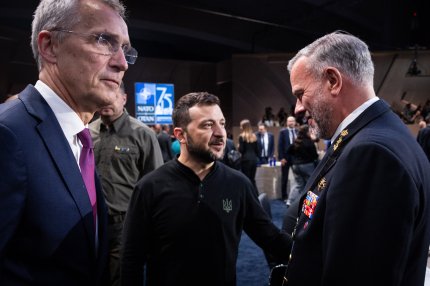At a time when Ukraine heroically continues to fight for its independence in the face of Russian armed aggression, Western partners still do not dare to take decisive action against the aggressor country.
Points of attention
- NATO lacks a concrete plan to defeat the Russian Federation, posing risks to Ukraine's independence and European security.
- Western partners show hesitancy in confronting Russia, raising concerns about the future of Ukraine and NATO's effectiveness.
- The article highlights the importance of focusing NATO's efforts on confronting Russia on Europe's eastern borders to ensure security in the region.
- Challenges within NATO, including disagreements over global issues like Gaza and Ukraine, and the rise of China as a military supporter of Russia's war create further complexity.
- Emphasizing the need for NATO to shift focus from new global challenges and prioritize decisively confronting Russia to prevent potential dire consequences for Ukraine and the alliance.
Why NATO avoids a wider confrontation with the Russian Federation
The publication notes that although the Western partners agree that Russia's defeat in the criminal war against Ukraine is a key guarantee of the future security of the EU and the countries of the Euro-Atlantic space, NATO's plan for Ukraine only provides for help in survival, not victory over the aggressor country.
They have no plan to defeat Russia. Moreover, it seems that they are afraid of her. This is an open invitation to President Vladimir Putin to resume aggression in Eastern Europe, the authors of the article emphasize.

According to the former US ambassador to NATO, Kurt Volker, uncertainty remains in Washington about the future of Ukraine.
When the dust settles after all the motorcades leave Washington, Ukraine will be as uncertain as it was before the summit. Fierce battles on the front lines, daily attacks by Russian bombers and drones on the Ukrainian civilian population and infrastructure, Putin who believes he can still win, Volker emphasizes.
Journalists of the publication emphasize that Western NATO partners face a number of important and critical problems.
Alliance members argue over Gaza, as well as Ukraine.
Why NATO does not have unity regarding global challenges
And now China has added to this, whose military support for Putin's war has been condemned.
The most obvious source of tension is the changing distribution of world power. China has become... a formidable rival... Today, Asia occupies a larger share of the US's attention, and Europe - a smaller one. As a result, the transatlantic allies are gradually moving away from each other. At the same time, efforts aimed at ensuring that NATO, and not just the US, play a more significant role in the Indo-Pacific region have limited opportunities, and European NATO members will not be able to greatly influence the balance of power in Asia, even if they want to, - explains Harvard University professor Stephen Walt.
According to the authors of the material, NATO should stop hustling in search of new global challenges and missions and focus on confronting Russia on the Eastern European borders.
Russia remains the raison d'être of NATO. And so it has always been. Deterrence is not enough. Putin must be unequivocally defeated, and he and his murderous generals must be brought to justice. The alternative - the loss of Ukraine - could be the death knell for NATO itself, the authors of the material conclude.



